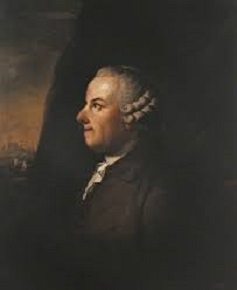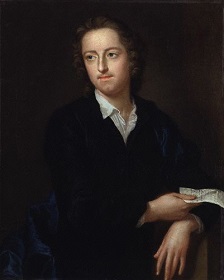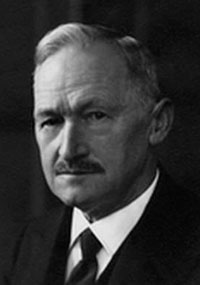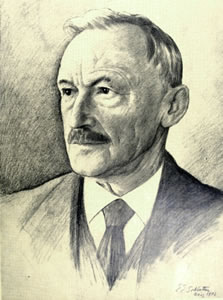De Engelse dichter en geleerde Thomas Gray werd geboren op 26 december 1716 in Londen. Zie ook alle tags voor Thomas Gray op dit blog.
The Bard
II.3.
“Fill high the sparkling bowl,
The rich repast prepare;
Reft of a crown, he yet may share the feast.
Close by the regal chair
Fell Thirst and Famine scowl
A baleful smile upon their baffled guest.
Heard ye the din of battle bray,
Lance to lance, and horse to horse?
Long years of havoc urge their destin’d course
And thro’ the kindred squadrons mow their way.
Ye towers of Julius, London’s lasting shame,
With many a foul and midnight murther fed,
Revere his consort’s faith, his father’s fame,
And spare the meek usurper’s holy head.
Above, below, the rose of snow,
Twined with her blushing foe, we spread:
The bristled Boar in infant-gore
Wallows beneath the thorny shade.
Now, brothers, bending o’er th’ accursed loom
Stamp we our vengeance deep, and ratify his doom.
III.1.
“Edward, lo! to sudden fate
(Weave we the woof. The thread is spun)
Half of thy heart we consecrate.
(The web is wove. The work is done.)’
Stay, oh stay! nor thus forlorn
Leave me unbless’d, unpitied, here to mourn!
In yon bright track, that fires the western skies!
They melt, they vanish from my eyes.
But oh! what solemn scenes on Snowdon’s height
Descending slow their glitt’ring skirts unroll?
Visions of glory, spare my aching sight,
Ye unborn Ages, crowd not on my soul!
No more our long-lost Arthur we bewail.
All-hail, ye genuine kings, Britannia’s issue, hail!
Thomas Gray (26 december 1716 – 30 juli 1771)
Gedenkplaat in Londen
De Franse schrijver, polemist en journalist Jean Galtier-Boissière werd geboren op 26 december 1891 in Parijs. Zie ook alle tags voor Jean Galtier-Boissière op dit blog.
Uit: Un hiver à Souchez
« Il me parle parfois de sa vie d’avant la guerre : elle lui apparaît comme un rêve indistinct. Je crois qu’il ne se rappelle plus très bien comment une femme est faite. Cependant il est allé une fois en permission, en remontant de seize jours de tranchées dans un secteur terrible.
A Paris, tandis qu’il se rendait d’une gare à l’autre, une dame a dit comme ça : ” Oh ! ce qu’il est sale, celui-là ! Il y en a qui doivent le faire exprès ! “.
Au pays, il a fait ripaille. Comme il ne racontait rien, les gens disaient : ” Il n’a pas dû être bien exposé, il n’a même pas la croix de guerre ! “
Il est revenu au front sans trop de peine, n’ayant pas eu le temps de reprendre des habitudes, et c’est plutôt au milieu des gens de l’arrière qu’il se sentait dépaysé.
(…)
C’est au début de 1915 que j’entendis parler pour la première fois de fraternisations. Au fond des abris on racontait que dans le secteur du fort de Brimont, entre Reims et Berry-au-Bac, la dernière nuit de Noël, fantassins français et allemands étaient sortis en masse des tranchées et s’étaient jetés dans les bras les uns des autres. Le commandement était affolé et il fallut, des deux côtés, la menace d’ordonner à l’artillerie de tirer dans le tas, pour faire réintégrer leurs tranchées aux adversaires un instant réconciliés.”
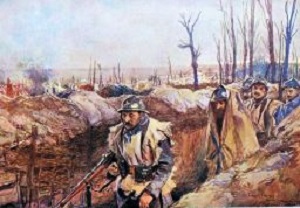
Jean Galtier-Boissière (26 december 1891 – 22 januari 1966)
Un hiver à Souchez – illustratie door Jean Galtier-Boissière
De Duitse dichter en schrijver Ernst Moritz Arndt werd op 26 december 1769 in Groß-Schoritz geboren op het eiland Rügen. Zie ook alle tags voor Ernst Moritz Arndt op dit blog.
Freude
1797
Freundlich leuchten die Sonne, Mond und Sterne,
Freundlich schimmert das Blumenkleid der Erde,
Mächtig brauset das Meer mit seinen Wellen
Furchtbar und lieblich.
Droben kreiset in Sonnenglut der Adler,
Drunten sumset der Käfer und die Biene,
Aus den Büschen klingen der Nachtigallen
Zärtliche Lieder.
Ja du bist schön und golden, Mutter Erde,
Schön in deinen rosigen Abendlocken,
Duftig in deines Erwachens Silberschimmer,
Bräutlich und züchtig.
Lustig hüpfest du hin im Weltentanze,
Alle deine Kinder am warmen Herzen,
Wandelst freudig dahin in deiner Sonne
Funkelndem Reigen.
Lustig sei und leuchtend des Menschen Stirne!
Nur dem Fröhlichen blüht der Baum des Lebens,
Dem Unschuldigen rinnt der Born der Jugend
Auch noch im Alter.
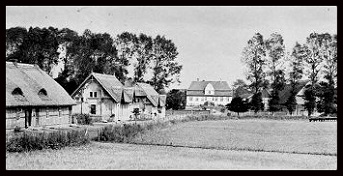
Ernst Moritz Arndt (26 december 1769 – 29 januari 1860)
Groß Schoritz
De Zwitserse dichter en schrijver Freiherr Johann Gaudenz von Salis-Seewis werd geboren op 26 december 1762 op slot Bothmar bei Malans. Zie ook alle tags voor Johann Gaudenz von Salis-Seewis op dit blog.
Lied zu singen bei einer Wasserfahrt
Wir ruhen vom Wasser gewiegt,
Im Kreise vertraulich und enge;
Durch Eintracht wie Blumengehänge
Verknüpft und in Reihen gefügt:
Uns sondert von lästiger Menge
Die Flut, die den Nachen umschmiegt.
So gleiten, im Raume vereint,
Wir auf der Vergänglichkeit Wellen,
Wo Freunde sich innig gesellen
Zum Freunde, der redlich es meint!
Getrost, weil die dunkelsten Stellen
Ein Glanz aus der Höhe bescheint.
Ach! trüg’ uns die fährliche Flut
Des Lebens so friedlich und leise!
O drohte nie Trennung dem Kreise,
Der sorglos um Zukunft hier ruht!
O nähm’ uns am Ziele der Reise
Elysiums Busen in Hut!
Verhallen mag unser Gesang,
Wie Flötenhauch schwinden das Leben;
Mit Jubel und Seufzern verschweben
Des Daseyns zerfließender Klang!
Der Geist wird verklärt sich erheben,
Wenn Lethe sein Fahrzeug verschlang.
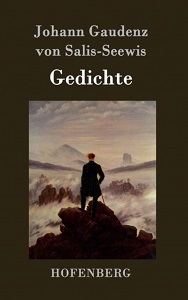
Johann Gaudenz von Salis-Seewis (26 december 1762 – 29 januari 1834)
Cover
De Amerikaanse schrijfster Emma Dorothy Eliza Nevitte Southworth werd geboren op 26 december 1819 in Washington, D.C. Zie ook alle tags voor E. D. E. N. Southworth op dit blog.
Uit: The Hidden Hand
“On his left hand stood his cozy bedstead, with its warm crimson curtains festooned back, revealing the luxurious swell of the full feather bed and pillows, with their snow-white linen and lamb’s-wool blankets, inviting repose. Between this bedstead and the corner of the fireplace stood Old Hurricane’s ancient body servant Wool, engaged in warming a crimson cloth nightcap.
“Fools!” muttered Old Hurricane, over his punch–”jacks! they’ll all get the pleurisy except those that get drunk! Did they all go, Wool?”
“Ebery man, ‘oman and chile, sar!–’cept ’tis me and coachman, sar!”
“More fools they! And I shouldn’t wonder if you, you old scarecrow, didn’t want to go too!”
“No, Marse–”
“I know better, sir! Don’t contradict me! Well, as soon as I’m in bed, and that won’t be long now, you may go–so that you get back in time to wait on me to-morrow morning.”
“Thanky, marse.”
“Hold your tongue! You’re as big a fool as the rest.
“I take this,” said Old Hurricane, as he sipped his punch and smacked his lips– “I take this to be the very quintessence of human enjoyment–sitting here in my soft, warm chair before the fire, toasting my legs, sipping my punch, listening on the one hand to the storm without and glancing on the other hand at my comfortable bed waiting there to receive my sleepy head. If there is anything better than this in this world I wish somebody would let me know it.”
“It’s all werry comformable indeed, marse,” said the obsequious Wool.
“I wonder, now, if there is anything on the face of the earth that would tempt me to leave my cozy fireside and go abroad to-night? I wonder how large a promise of pleasure or profit or glory it would take now?”
“Much as ebber Congress itse’f could give, if it give you a penance for all your sarvins,” suggested Wool.
“Yes, and more; for I wouldn’t leave my home comforts to-night to insure not only the pension but the thanks of Congress!” said the old man, replenishing his glass with steaming punch and drinking it off leisurely.
The clock struck eleven. The old man again replenished his glass, and, while sipping its contents, said:
“You may fill the warming-pan and warm my bed, Wool. The fumes of this fragrant punch are beginning to rise to my head and make me sleepy.”
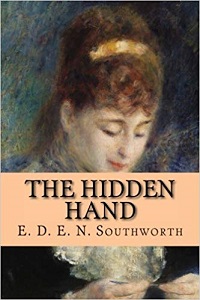
E. D. E. N. Southworth (26 december 1819 – 30 juni 1899)
Cover
De Franse dichter, schrijver en filosoof Jean-François de Saint-Lambert werd geboren op 26 december 1716 in Nancy. Zie ook alle tags voor Jean-François de Saint-Lambert op dit blog.
L’Hiver (Fragment)
Les tyrans des forêts par la faim dévorés,
Impatiens du meurtre et de sang altérés,
Quittent pendant la nuit les bois et les montagnes:
Ils courent en fureur à travers les campagnes ;
lls osent s’élancer sur l’homme épouvanté :
Ce roi de l’univers , sa grâce et sa fierté ,
Ce front oit de son rang la noblesse est empreinte,
Ne leur inspire plus le respect et la crainte.
Ces monstres affamés cherchent dans les tombeaux
Des essemens poudreux ou d’horribles lambeaux.
On entend quelquefois des cris lents et funèbres,
Des hurlemens affreux rouler dans les ténèbres,
Et se mêler dans l’air aux tristes sifflemens
Qui partent d’un vieux dôme ébranlé par les vents :
Ces funestes concerts que les monts réfléchissent,
Semblent être l’écho des mânes qui gémissent.
Le lâche qui poursuit l’innocent opprimé ,
L’ingrat qui blesse un coeur dont il était aimé ,
Le perfide assassin , le monstre sanguinaire ,
Qui plongea le couteau dans le sein de son frère,
Croit voir eu ce moment les spectres des enfers,
Et leurs lugubres jeux couvrir les champs déserts:
Leurs longs gémisse mens, leurs clameurs lamen tables
Retentissent dans l’ ombre au fond des coeurs coupables.
Ah ! si l’ami des lois, le juste est sans remords,
S’il n’entend point les cris des démons ou des morts,
Il déplore , il ressent ces iléaux innombrables
Qu’accumule l’Hiver sur nos jours misérables.
O toi ! qui fis nos sens , toi qui formas nos meurs,
Ou rends-nous moins sensible , ou suspens tes rigueurs,
Dieu ;qu i dispose tout, Dieu, dont les mains fécondes
Ont tiré du néant les soleils et les mondes,
Ne pouvais-tu de l’homme écarter les douleurs?
Glacé par les frimas, brûlé par les chaleurs,
Jeté par la nature à travers les orages,
Sur des bords ennemis, dans des déserts sauvages,
Abandonné sans force au choc des élémens,
Le martyr de ses sens et de ses sentirnens,
De chagrins en chagrins conduit par l’espérance,
Il passe dans les pleurs son moment d’existence,
Et se traîne accablé sous le poids de ses maux,
Sur un monde en ruine, à travers les tombeaux.
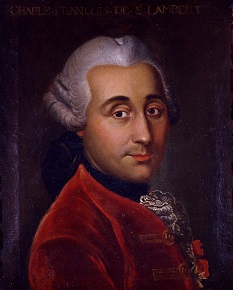
Jean-François de Saint-Lambert (26 december 1716 – 9 februari 1803)
Anoniem portret

